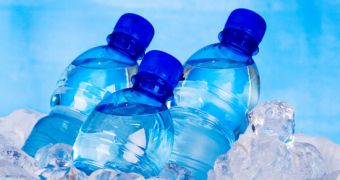A report released by the International Bottled Water Association says that, contrary to expectations, one liter of water does not always equal one liter of water.
Thus, it appears that, for each liter of bottled water that comes out the doors of a bottling plant, a total of 1.39 liters are actually used. And this is not including the water that is used to manufacture packaging.
Otherwise put, it takes 1.39 liters of water to make 1 liter of bottled water.
As the International Bottled Water Association explains, “On average, it takes 1 liter of ingredient water and 4/10 of a liter of water used for facility processes (eg. treatment, bottling etc.) to produce 1 liter of finished bottled water products.”
Greenheads have for some time now been protesting not just the bottled water industry, but also the soft drinks one. Still, they chiefly focused on going on and on about how the plastic bottles in which these beverages are sold are often not properly disposed of and end up polluting the environment.
As it turns out, it might not be a bad idea to start paying closer attention to the water resources used by these industries as well.
What's interesting is that, as little environmentally friendly as the bottled water industry might be, other businesses of this kind actually have a much greater ecological footprint as far as water consumption goes.
Thus, NPR tells us that 2.02 liters of water go into manufacturing 1 liter of soda, 4 liters of water are used whenever 1 liter of beer is produced, and making 1 liter of wine takes up 4.75 liters of this resource.
Hard alcohol is by far the worst of the bunch, meaning that 34.55 liters of water are needed to obtain just 1 liter of it.
“In comparison, other beverages sectors such as carbonated soft drink bottling and beer production average have larger water use ratios driven by higher intensity processes unique to these other beverages such as flavor mixing, blending, carbonation, fermentation etc.,” the report details.
Because of this, the International Bottled Water Association wished to stress that, from where they stand, the water bottling industry is way greener than many think it to be.
“Bottled water products are extremely efficient in terms of water use compared to some other packaged beverages,” says Chris Hogan, a spokesperson for the association.

 14 DAY TRIAL //
14 DAY TRIAL //